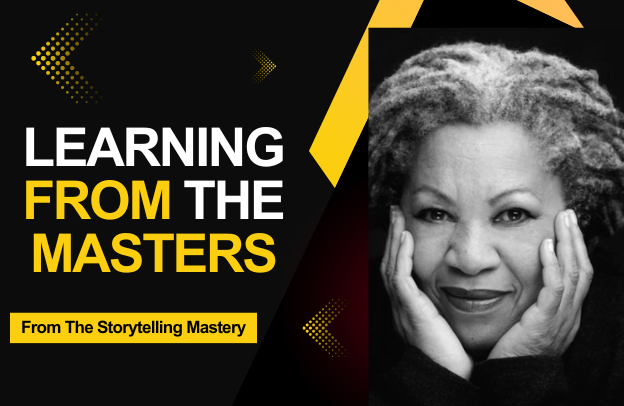5 Business Lessons From Think And Grow Rich By Napoleon Hill

“Think and Grow Rich,” by Napoleon Hill, published in 1937 is widely celebrated as a cornerstone in personal development and self-improvement literature. Hill asserted that his inspiration for the book came from a suggestion by the renowned business magnate and philanthropist, Andrew Carnegie. Start by downloading the first chapter of The Storytelling Mastery.
In the book, Hill draws on inspirational stories from Andrew Carnegie, Henry Ford, Thomas Edison, and other millionaires of the time to illustrate his powerful principles.
The key message of “Think and Grow Rich” by Napoleon Hill is that success starts with a burning desire, coupled with faith, specialized knowledge, imagination, organized planning, and persistent effort. Napoleon Hill emphasizes the power of mindset and the importance of leveraging personal strengths and collaborative networks to achieve one’s goals.
The full video of 5 Business Lessons From Think And Grow Rich By Napoleon Hill
Who was Napoleon Hill?
Born October 26, 1883, and died November 8, 1970, Oliver Napoleon Hill was an American self-help author and motivational speaker best known for his influential work in the field of personal development and success philosophy.
His most famous book, “Think and Grow Rich,” published in 1937, is considered one of the best-selling books of all time and a cornerstone in the self-help genre. Hill’s philosophy emphasized the power of the human mind and the importance of a positive mental attitude in achieving success.
Drawing on his own experiences and interviews with successful individuals, including industrialist Andrew Carnegie, Hill outlined key principles such as the importance of setting clear goals, cultivating persistence, and maintaining a strong belief in one’s ability to achieve their objectives.
Throughout his career, Napoleon Hill dedicated himself to researching and promoting the principles of success, earning him widespread recognition as a pioneer in the self-help industry. His teachings continue to influence countless individuals seeking personal and professional development, and his work remains relevant and widely studied in the field of motivation and achievement.
Now, let’s dive into the five key lessons from “Think and Grow Rich” by Napoleon Hill, and how to apply each lesson to a business context through storytelling.
1. The Power of Desire:
Lesson from the Book: Hill emphasizes the importance of a burning desire to achieve one’s goals. To demonstrate this, he shares the story of Edwin C. Barnes, who desired to partner with Thomas Edison. If you have read the book, you will understand that after a lot of sacrifice, the desire of Edwin C. Barnes eventually became a reality for him.
Business Application: In a business context, imagine a startup founder who passionately believes in solving a particular problem, because being in business is nothing more than providing a solution to people’s problems. And the more important and bigger the problem you are solving, the richer you will become.
How this becomes interesting is that through storytelling, the founder can convey their journey, the obstacles faced, and the unwavering desire to make a positive impact. This emotional connection can attract investors, partners, and customers who share a similar passion.
2. Faith and Autosuggestion:
Lesson from the Book: Hill discusses the power of faith and the use of autosuggestion to influence the subconscious mind. He shares the story of R.U. Darby, who, after failing to find gold, discovered that he was just a few feet away from a vast amount.
One key takeaway from that message is that many entrepreneurs and people, in general, quit while a few feet away from the gold they have been working for.
Business Application: A business leader could use storytelling to communicate a vision that instills faith in the team during challenging times. By consistently reinforcing positive beliefs through storytelling, leaders can inspire their teams to persevere, innovate, and eventually discover the “gold” that lies just beyond initial setbacks.
So, don’t quit a few feet away from your desired gold because it is right there if you can have faith in your mission and keep digging despite the troubles and distractions.
3. Specialized Knowledge:
Lesson from the Book: Hill emphasizes the importance of acquiring specialized knowledge and surrounding oneself with a mastermind group. He illustrates this with the story of Henry Ford, who relied on his team of experts.
Business Application: A CEO sharing a story about the collaborative expertise that drives their company forward highlights the value of specialized knowledge. It encourages employees to focus on continuous learning and reinforces the idea that collective intelligence is key to overcoming challenges and achieving success.
4. Imagination and Organized Planning:
Lesson from the Book: Hill stresses the significance of imagination and organized planning. He shares the story of Thomas Edison, who turned imagination into reality through meticulous planning.
Business Application: Entrepreneurs can use storytelling to vividly describe their vision and how they strategically plan to achieve it. This narrative can captivate investors and stakeholders, illustrating that imaginative ideas are grounded in practical, well-thought-out strategies.
5. Persistence:
Lesson from the Book: Hill highlights the importance of persistence by citing the example of Colonel Sanders, who found success with Kentucky Fried Chicken only after facing numerous rejections.
Business Application: Through storytelling, a business leader can convey the determination to overcome obstacles and persist in the face of failure. Sharing stories of resilience and adaptability creates a narrative that resonates with customers and investors, reinforcing the brand’s commitment to long-term success.
Incorporating these storytelling techniques into business narratives can help create a compelling and relatable brand story, fostering connections with employees, customers, and stakeholders.
His remembrance as a storytelling master
Napoleon Hill should be remembered as a pioneering figure in the self-help and personal development movement, whose influential work continues to inspire and guide individuals seeking success and personal growth.
His most enduring legacy is the timeless wisdom encapsulated in his landmark book, “Think and Grow Rich,” where he distilled key principles for achieving success, emphasizing the power of positive thinking, goal setting, and perseverance.
Hill’s teachings transcend generations, offering a timeless blueprint for individuals striving to unlock their full potential and overcome obstacles on their path to success.
Hill’s impact extends beyond his written work, as he played a pivotal role in popularizing the idea that success is a product of mindset and attitude.
By emphasizing the importance of a positive mental attitude, self-discipline, and a burning desire to achieve one’s goals, Napoleon Hill has left an indelible mark on the landscape of personal development, influencing countless motivational speakers, life coaches, and success-seekers worldwide.
To learn more, join our storytelling mastery for businesses at Academy.aclasses.org/storytellingmastery.





